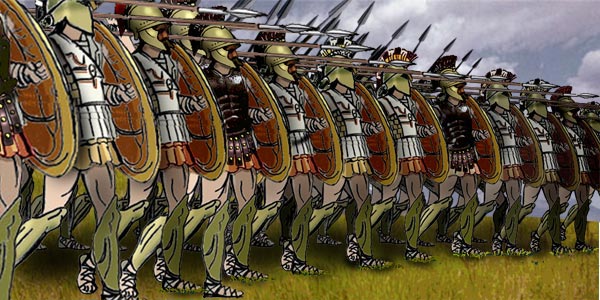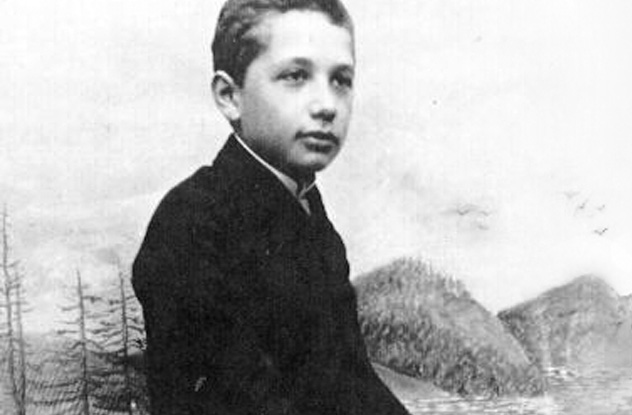
artist's conception of ancient Greek soldiers in phalanx formation
A serious problem with the idea of a society that is balanced, loving, peaceful, and prosperous is the problem of violence. A prosperous, orderly, just state will be envied by its neighbors, and thus it will be in danger of being attacked from without. Even within that state there will be some people who will try to get luxuries that they have not earned and to get those luxuries by either force or deceit. If we can arrive at a global system of governance at some time in the future, the outside invaders will cease to be a threat because every human on the planet will be a member of one cultural community. But the realizing of that dream is a long way off. And even then, any such state will still have people in its midst who will try to become wealthy in sociopathic ways.
What can be done about the alien invaders and the criminals among us? Plato tackled this problem long ago. His solution is just a detailed, rational version of what most societies even in his time had been doing for centuries. (There is a link below to one of the online versions of "The Republic", Book II where these matters are discussed. *)
We have to fund and train professionals who are skilled at individual and group forms of fighting and whose loyalty is to the community that they serve. Police and soldiers, in other words. Plato said that the community, via the state that the people set up, should pay for the training and maintenance of one professional force for both tasks. If these professionals are skilled at subduing and, if necessary, killing people who threaten the stability of the community, then logically, they should be available for those tasks whether the threats are from within or without.
There is always a danger, however, that the kinds of people that can do the policing and soldiering may have too much of what Plato calls a "spirited nature". If we train police personnel and soldiers to not just be skilled in violence but focused and driven in their pursuit of targets, what are these people to do when there are no threats around? They can only sharpen their skills and hone their fighting edge for so long. Sooner or later, they are going to get restless. And then there will also be the ones who have already been to war and fought and killed. They will find life in an orderly community hard to adjust to.
There are many examples of these kinds of characters in film and literature. Their stories dramatize, sometimes really well, the difficulties that restless and poorly adjusted soldiers and police personnel undergo when they are stuck in prolonged periods of inactivity or, harder yet, retirement. "The Great Santini" is about such an American. The character Al Neri in "The Godfather" is a former policeman fed up with the inefficiency and stupidity that he sees in the New York Police Department. Captain Willard in "Apocalypse Now" tried to go back to the US after one tour of duty in Viet Nam. He found he couldn't adjust. Paul, the protagonist in "All Quiet On the Western Front", knows that he and his comrades will not be able to handle civilian life if they do survive to go home. In the end, he has no idea what he is going to do. The book's ending even implies that he let a sniper get him because he didn't want to live anymore. After years of trying to adjust, Luke in "Cool Hand Luke" is destroyed by the guilt he feels over the things that he did in the war. That's what the movie is about.

Paul Newman (and supporting cast) in "Cool Hand Luke"
In Indian culture, "Such A Long Journey" focuses on a man who thought he was doing patriotic acts for his nation, and who finally realizes that he has been manipulated. Fortunately, he is resilient and it appears at the end of the story that he is going to survive by returning his focus to his family, where it probably should have been all along. In Canadian culture, the novel "Three Day Road" is about two aboriginal Canadians, one who is destroyed by World War I, and one who makes it back to his former life, scarred but able to go on because of the love of his aunt. They have no one else in their family any more, but they do have each other, and she refuses to give up on him. Her love saves him in the end.
Every generation of retired soldiers and police personnel in every land has contained thousands of glaring examples of people who could not adjust to civilian life. Every nation has in its culture works of film and literature that dramatize the plight of these psychologically ruined people. Some of the real people who have seen and done horrors do go back to civilian life successfully, which proves that the human psyche can be very resilient. But many others don't. The shame on the rest of us comes when we abandon the veterans and let them sink or swim on their own. They need help, but, by and large, they do not get it. That situation is very wrong. Perhaps, in future we can do better.
Plato does deal with some of these problems. In "The Republic", Socrates and Glaucon discuss how it can be possible for a "spirited nature" to be combined with a "gentler nature". Socrates feels that there is real evidence that the two can coexist in one living being because he sees it in good dogs. The best dogs are gentle to the persons that they know and trust and vicious to strangers when they need to be. Surely, he implies, humans can have combinations of opposite qualities in their natures as well.
But Socrates hasn't really settled the matter. There are still problems with his line of thought. In the first place, the specially trained dogs called "K9" dogs, that is ones trained by the police or military to attack on command, have for centuries been euthanized after they reach retirement in nearly every country that has such dogs. There is just too great a danger that they may fall into the wrong hands, and be used as subtle, lethal weapons. They can look harmless until they see an event or hear a command that triggers their attack response. Is there a similar danger in retired police or military personnel? I think the answer is yes. Even in our times, the mercenaries who fight all over the world in dirty little hidden wars are often disillusioned, idle professionals who have left official service, but who were originally trained in the West.
In the second place, Socrates does not deal with the ultimate goals toward which these professionals should be trained. What general principles are to be used as guidelines in the running of the state? Those ideas, he says, are too complex for soldiers to be concerned with. The general principles that must be used as he sets up his ideal state are matters to be understood and adjusted only by his ruling class, the philosophers.
Ordinary citizens should concern themselves only with doing their jobs well -- farming, healing the sick and injured, making shoes, and so on. Soldiers and police should concern themselves only with staying in peak physical and mental condition, ready to fight at any time. Only philosophers have the attributes of intelligence and education that will be needed to understand the principles behind these matters and to make decisions involving the weighing of gentle, loving natures and spirited, vigilant ones. The balances that need to be struck to keep the state moving forward vigorously, but safely, are too subtle for most of the population to grasp. In fact, Socrates (who is only a voice for Plato) even favors the policy of telling "noble lies" to all who are not philosophers if those lies are needed to give focus and determination to the whole state. Whatever else happens, the state must survive. That axiom is basic in "The Republic", even though Plato never articulates it openly. And in fairness to Plato, the same axiom appears to have been basic to all nations and the states they have set up all over the world for long as we have records or artifacts of human activity.
The people have to be brainwashed and then distracted with "bread and circuses", as the Roman poet Juvenal put it. The police and military will be drawn from those among the general population who are best suited to do soldier's types of duties without question or critical insight. The state can't afford to contain a whole lot of citizens who analyze and question. If it does, it won't act decisively in a crisis. So the thinking goes, and not just in Plato.
If you've been reading this blog, you will know that I bitterly disagree. The whole point of the smart and educated people in society ought to be to explain to everyone what is going on at the top levels of society and why. Smart, educated people using their gifts to manipulate others are the moral equivalent of strong, trained fighters using their skills to bully. Just as wrong for either of them to do it. I tell people every nuance of every problem that I see out there in the world because that is simple justice. I don't pose as being too good for the people. I was born, raised, and educated in a working class family and neighborhood, and I disagree diametrically with all who pose as being above the people. In the end, no one is.
No more "exceptionalism" for Brits, French, Canadians, Americans, Chinese, Serbians, Catholics, Protestants, Hindus, Muslims, Plato's philosophers, or anyone else. The day of blind patriotism and noble lies has to end. Freedom and love, courage and wisdom don't need to be justified in that unquestioning way. These values can be justified logically to all by our showing how they connect to the roots of empirical reality. Moral realism, thoroughly understood, proves the simple good sense of pluralistic democracy. Freedom and love in balance maximize our chances of evolving and surviving over the long haul. In the end, there is no deeper or more worthy principle for any of us to aspire to.
No more "exceptionalism" for Brits, French, Canadians, Americans, Chinese, Serbians, Catholics, Protestants, Hindus, Muslims, Plato's philosophers, or anyone else. The day of blind patriotism and noble lies has to end. Freedom and love, courage and wisdom don't need to be justified in that unquestioning way. These values can be justified logically to all by our showing how they connect to the roots of empirical reality. Moral realism, thoroughly understood, proves the simple good sense of pluralistic democracy. Freedom and love in balance maximize our chances of evolving and surviving over the long haul. In the end, there is no deeper or more worthy principle for any of us to aspire to.
*http://classics.mit.edu/Plato/republic.3.ii.html



























